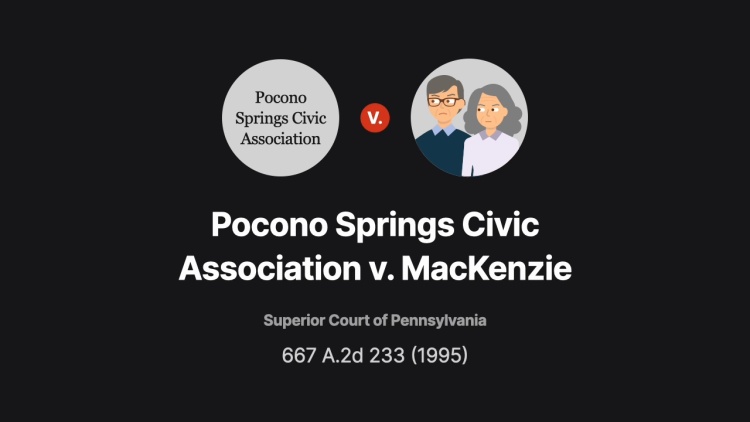Pocono Springs Civic Association v. MacKenzie
Pennsylvania Superior Court
667 A.2d 233 (1995)
- Written by Jamie Milne, JD
Facts
In 1969, Joseph and Doris MacKenzie (defendants) purchased vacant real property in the Pocono Springs Development, which was governed by the Pocono Springs Civic Association (association) (plaintiff). The association assessed annual dues on each property to be paid by the respective landowners. In 1987, the MacKenzies attempted to sell their land. However, the prospective buyers backed out when it was determined that the lot did not meet the township’s sewage requirements. Believing the lot to be essentially worthless, the MacKenzies attempted to turn the lot over to the association, but the association refused to take delivery. The MacKenzies then attempted to gift the land to the association to be used as a park, but the association still refused to accept delivery. The MacKenzies stopped paying real estate taxes on the property in 1986, which eventually resulted in two attempts by the county tax bureau to sell the property and recover unpaid taxes. Both attempts were unsuccessful, having no buyers. The MacKenzies also mailed a notarized statement to all interested parties stating their intent to abandon the property, stopped visiting the lot, and refused to accept mail at that address. However, the MacKenzies never transferred the deed or title to another. They thus remained owners in fee simple, having a recorded deed and perfect title. The association sued the MacKenzies, seeking to recover unpaid association dues. The MacKenzies argued that they did not owe dues because they had abandoned the property. The trial court granted summary judgment in the association’s favor, and the MacKenzies appealed.
Rule of Law
Issue
Holding and Reasoning (Rowley, J.)
What to do next…
Here's why 907,000 law students have relied on our case briefs:
- Written by law professors and practitioners, not other law students. 47,100 briefs, keyed to 996 casebooks. Top-notch customer support.
- The right amount of information, includes the facts, issues, rule of law, holding and reasoning, and any concurrences and dissents.
- Access in your classes, works on your mobile and tablet. Massive library of related video lessons and high quality multiple-choice questions.
- Easy to use, uniform format for every case brief. Written in plain English, not in legalese. Our briefs summarize and simplify; they don’t just repeat the court’s language.





